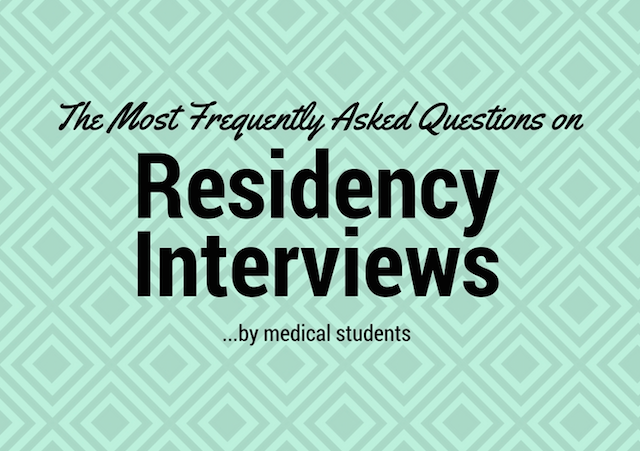It’s my first interview season as a resident and I am loving the free lunches. Uh, I mean…meeting all of the applicants. It’s kind of strange being on the other side of things because I remember asking the exact same annoying inquisitive questions that all of you are asking. However, I’m realizing most of my answers are not specific to my program and I end up giving general residency advice like how to survive your intern year and how to create your residency rank list. Here’s what I tell the prospective fourth years:
What’s your favorite part of your residency program
My co-residents. It’s annoyingly corny but true. This is a highly sensitive test for weeding out unhappy residency programs. Residency sucks but you should at least be able to get along with the people you are stuck in residency with because the only thing worse than going through residency is going through residency alone.
If you could change one thing about your program what would it be?
Daily free lunches, a personal assistant, and a raise would be nice. Otherwise, well…every residency program has there bugs but the tell of a good program is that the administration will listen to their residents and make appropriate changes. A better question to ask is ‘what are the most recent changes that were made to your program based on complaints or concerns raised by residents’. Ask that. You’ll look like, really smart.
Why did you choose this program?
It was a gut feeling. Every program I interviewed at had essentially the same things. Maybe some had more or less research, was in a bigger or smaller city, had a bigger or smaller residency class size, or had varying degrees of fellowship opportunities. But you will likely be a successful doctor wherever you end up. The question you have to ask yourself is ‘will I be happy in this city at this hospital if I match here’. And the answer to that question depends a lot on you (and your family’s) priorities.
What stood out about your top choice residency programs compared to the rest on your list?
The program director’s leadership and enthusiasm when meeting us (despite likely giving the same speech and presentation hundreds of times before), the impressive amount of teaching that occurs during morning report (yes, it’s like this every morning), and my interactions with the other applicants and residents . Again, these residents and fellow applicants are the people you’re going to be stuck with for the next three years. If you can’t enjoy an afternoon with these people then that residency program likely isn’t a great fit for you. My favorite interview days were ones with the best lunches. And also when I got along well with the other residents and applicants. But also lunch.
So lunch is really important to you, huh?
It’s all about the little things. When a program would take us to their cafeteria for lunch it made me feel like they weren’t even trying to impress us. Sure, maybe they have an amazing cafeteria and all of the residents eat there everyday. Except it ends up coming across like a cheap date who forgot their wallet at home. It would never be a reason to rank a program higher or lower but it consistently served as a surrogate marker for other things that may be awry. Like someone who wears ankle socks with dress pants. Judged.
So you get along well with your residency class?
I enjoy hanging out and working with most of my co-interns and residents. You find your people early on and you go through hell with one another. Working on the same floor together for a month builds some pretty strong bonds. Especially if chased with tequila. Just recognize you aren’t going to get along with everybody and that’s okay. Hopefully the bell-curve is skewed towards positivity and most attendings, fellows, and residents there aren’t jerks. Again, big red flag if lots of people within the residency program don’t like one another.
Are you involved in any research at the moment?
I’m currently four months into residency. I finally have my feet underneath me and I can navigate the hospital system pretty well. Don’t get me wrong, I’m still a bumbling intern but I am more efficient bumbling intern compared to July 1st. I now feel comfortable pursuing research projects and am currently getting involved in a QI project. However, I’m waiting to take step 3 before I jump into some bench research going on in my hospital. Just beware, the only thing worse than not performing any research is getting involved in research and dropping out because you weren’t available or weren’t interested. It’s unprofessional, word will spread, and people will be less willing to offer you future research opportunities.
When are you taking step 3?
ASAP! More specifically the middle of December. Many of my friends in OB/GYN and pediatrics have already taken and passed step 3. Internal medicine constitutes a large proportion of the exam so there isn’t a huge rush for IM residents to take step 3 because you’re going to learn the majority of what’s on the exam during your training anyway. However, non-medicine residents are often advised to take the exam as soon as possible so they can get it out of the way. Personally, I’m taking a middle ground approach and will be taking it six months into my residency. It really depends on your schedule. Mine is lighter early on so I have time to finish UWorld (yes, it is the only resource I am using. Will confirm that it was a good decision once I pass). Getting step 3 out of the way also let’s you finally focus on the more important things in residency. Like research and not killing your patients.
Should I take step 3 before starting residency?
Only if you have an insane amount of time prior to residency. Otherwise, go enjoy your life and follow up on my next blog post about what to do the summer before residency! You can also check out my two blog posts on this exact subject:


